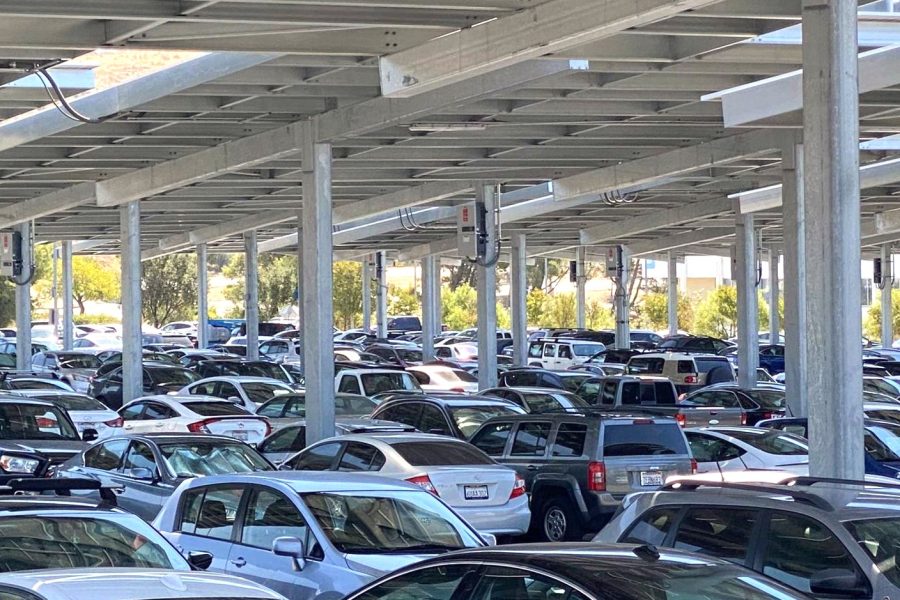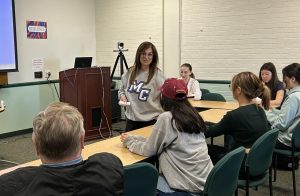Moorpark College students react to future ban on the sale of gas powered vehicles
Gas powered cars pack the Moorpark student lot on Tuesday, Sept. 6th, 2022. Photo credit: Teagan Davidge
September 17, 2022
A climate-change related executive order was issued by California Gov. Gavin Newsom in legislation published on Sept. 23, 2020. The order states that by 2035, all new cars and passenger trucks sold in-state must be zero-emission vehicles, also referred to as ZEV’s.
Transportation, as of now, accounts for 50% of California’s greenhouse gas emissions and 80% of its air pollutants. Climate protection is a central focus of Newsom’s campaign, and his recent directive, Executive Order N-79-20, is one of several climate change related initiatives in the works.
Seeing that most individuals use a gas powered vehicle to get to campus, the future ban on the sale of gas cars will likely be a big change for Moorpark College students and faculty,
Earlier this month, out of 30 students verbally polled on Moorpark College’s campus, 90% said they use fossil fuel power to make their way to school. The remaining 10% use either hybrid or electric vehicles, according to the poll.
Josh Mercer, a dual-enrolled student at Moorpark College, explained how Newsom’s ban on gas powered vehicles could have both positive and negative consequences.
“On the one hand, it sounds like it’d be an advantage for the environment, economically,” Mercer said. “There is the issue of limiting people’s personal choice and folks might not have access to other options. That could become an economic disadvantage.”
The price of electric vehicles was a common concern voiced by students. Mercer noted that as the demand for electric vehicles grows, so will their market price.
“If I was selling electric powered vehicles, I’d hike up the price!” Mercer joked. “As it becomes something more desirable, it easily becomes more inaccessible as well.”
Aware of the financial dilemma imposed on car consumers in the state, the California Air Resources Board shared several programs that aim to reduce consumers’ cost of transitioning to electric vehicles. Clean Cars 4 All, the Clean Vehicle Rebate Project and the Clean Vehicle Assistance Program all provide support for low-income car buyers planning to go zero-emission.
Miguel Santana is a third-year computer science major at Moorpark College. Santana, like many other students on campus, drives a gas powered vehicle to school. Santana is most concerned with the obstacles Newson’s executive order could pose to society.
“It depends on how [the gas car ban is] implemented, because you have to start setting up all the charging stations and stuff,” Santana said.
Although many students are skeptical, ZEVs are expected to cost less than gas powered vehicles by the time of the implementation of this ban. Charging fully at home costs about half as much when compared to the price of a full tank of gas. Additionally, battery-electric vehicles can save drivers up to 40% in maintenance costs.
While some students expressed their concerns about Newsom’s executive order, others expressed indifference about the future shift to electric vehicles. Kanan Shaw, a second year mechanical engineering student at Moorpark College, appeared to be unaffected by the recent news.
“I don’t really care,” Shaw stated. “I think it would be okay, as long as the way that [the electric cars are] powered is green.”
Shaw doubts electric vehicles will be as expensive as they are now in 2035.
According to the Office of the Governor’s website, although California is the first state to introduce such an order, the concept isn’t new altogether.
“California will be leading the nation in this effort – joining 15 countries that have already committed to phase out gasoline-powered cars and using our market power to push zero-emission vehicle innovation and drive down costs for everyone,” the website states.
Click here to learn more about Executive Order N-79-20. To stay updated on Gov. Newsom’s executive orders, proclamations, media advisories and press releases, click here.









